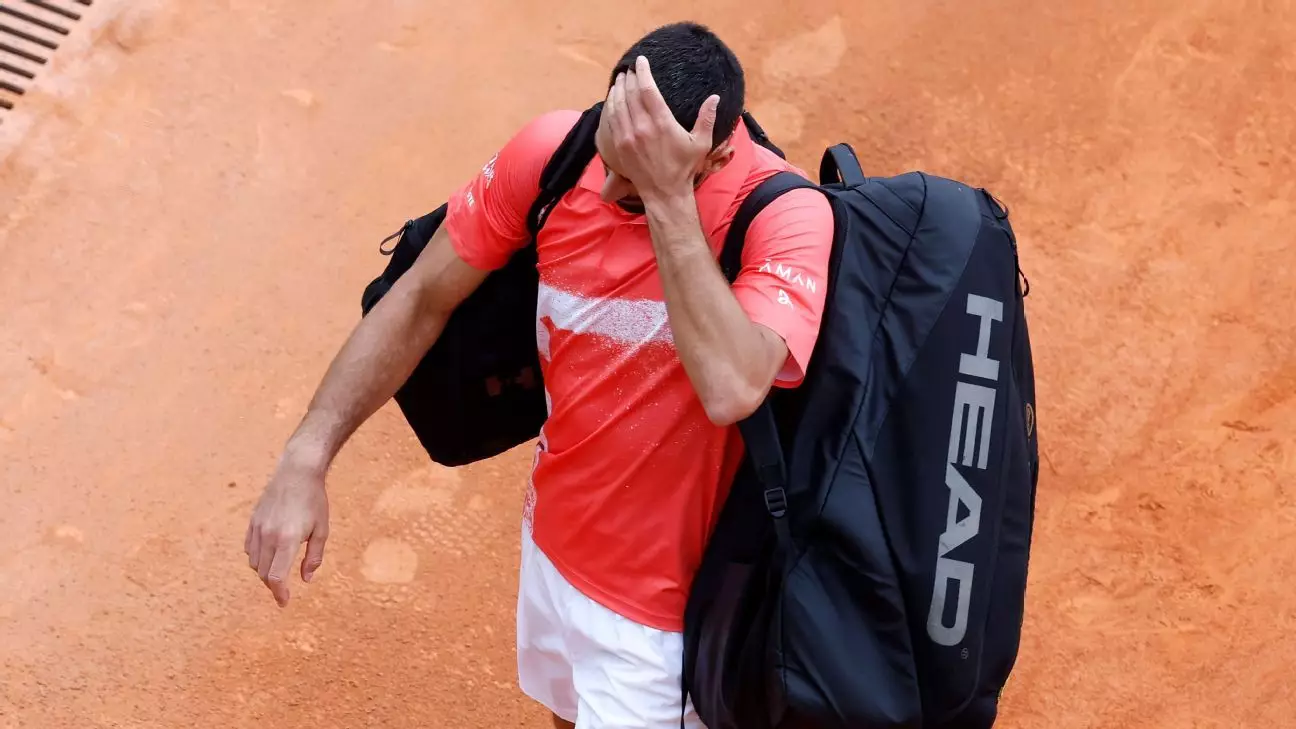In a world where predictability often reigns, the Monte Carlo Masters served up a slice of unpredictability with Alejandro Tabilo’s stunning victory over Novak Djokovic. In a rematch that echoed their encounter at last year’s Italian Open, the 27-year-old Chilean player handed Djokovic another unexpected defeat, leaving the tennis community astonished. The match concluded with a score of 6-3, 6-4, highlighting not only Tabilo’s skill but also the vulnerabilities of a once-dominant champion.
Tabilo’s triumph showcases not only his remarkable talent but also a psychological edge that appears to have developed in their matchups. “I remembered last time what I did well,” he stated in his post-match interview, revealing insights about how athletes can thrive by learning from past experiences. This kind of critical reflection is often where matches are won or lost, and Tabilo’s mental resilience illuminated Djokovic’s vulnerabilities in this high-stakes encounter.
Djokovic’s Fall from Grace: A Reality Check
As Djokovic took to the court, hopes were high for his milestone 100th career title. However, with 29 unforced errors littered across his performance, he candidly described his showing as “horrible.” This remark reflects a deep self-awareness that is sometimes lacking in professional athletes. Retrospectively, he justified his fissures by admitting to the weight of expectation and the nervousness that had taken hold of him throughout the match. This juxtaposition of societal expectation against personal performance creates a poignant narrative surrounding seasoned athletes, especially those who have worn the crown for so long.
Djokovic’s self-critical perspective is commendable, especially in a sport where egos often overshadow humility. He lamented not just his performance but also felt a sense of responsibility toward his fans who had come to witness him in peak form. This awareness, though admirable, also unveils a larger discourse on the mental pressures faced by elite athletes, a topic often overlooked in the fervor of victory and loss.
The Statistics Don’t Lie: A Pattern Emerges
Interestingly, Tabilo has yet to lose a set against Djokovic, a statistic that points to a deeper narrative of psychological dominance. Alongside Marat Safin and Jiri Vesely, Tabilo has now established a peculiar niche; this trio remains unbeaten against one of the greatest tennis players in history. Such an anomaly begs the question—what is it about their matchups that places them at an advantage? The blend of confidence and a fresh approach against a seasoned pro creates an atmosphere ripe for disruption, and Tabilo’s strategy is a testament to the dynamism of modern tennis.
This newfound trend of surprising victories against ostensibly invincible opponents conveys an essential truth about the sport: the line between triumph and defeat can often be razor-thin. The rise of underdogs like Tabilo reminds us all that mental resilience, when coupled with talent, can indeed shatter the preconceived hierarchies of elite sports.
Younger Generations Rise: Alcaraz and the Future of Tennis
Given Djokovic’s recent defeat, the narrative at the Monte Carlo Masters was not solely about the established champion’s shortcomings. Instead, the spotlight also shone brightly on the rising stars of the tennis world. Carlos Alcaraz, the defending champion at the French Open, ignited interest with his remarkable comeback against Francisco Cerundolo. His victory not only serves as a harbinger of things to come but also poses a looming question: are we witnessing a generational shift in the sport?
Alcaraz, with his potent blend of agility, power, and mental fortitude, symbolizes a new wave of tennis that could redefine the paradigms of success. As he aims for another title to bolster his burgeoning career, the excitement surrounding his matches signals a vibrant future for the ATP tour, characterized by thrilling rivalries, astounding prodigies, and a breaking of records that may soon become old news.
As we witness seasoned players face unforeseen defeats and younger competitors rise, the narrative in tennis is continually evolving. Djokovic’s uncharacteristic struggles at the Monte Carlo Masters may evoke discussions of twilight in his illustrious career, yet they also offer an opportunity for reflection and rejuvenation for the sport itself. The atmosphere at this tournament transcends mere competition, demanding that every player—be it a stalwart champion or an emerging talent—reassess their strategies and bolster their mental fortitude, reminding us that every match is a fresh opportunity for greatness.


Leave a Reply